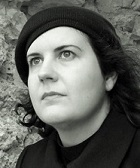|
Núria Añó
Núria Añó (Catalan: [ˈnuɾiə əˈɲo], Spanish: [ˈnuɾja aˈɲo]; born 1973) is a Catalan writer and a translator. Añó has exhibited her work in universities and institutions giving papers on literary creation or authors like Elfriede Jelinek,[1] Patricia Highsmith,[2] Salka Viertel,[3] Franz Werfel,[4] Karen Blixen[5] or Alexandre Dumas, fils,[6] as well as giving talks in libraries and secondary and higher education centres. She is also a member of several international artistic juries.[7] WorkAñó was born in Lleida, Catalonia, Spain. She started writing tales at a young age and published her first story in 1990. After that, she published in anthology books from abroad, such as the short stories 2066. Beginning the age of correction,[8] about climate change, or Presage,[9] about domestic violence, both translated into English. Her first novel Els nens de l'Elisa (2006) was third among the finalists for the 24th Ramon Llull Prize[10] for Catalan literature, one of the most relevant literary awards in Catalan language. This novel has a female main character detached from the clichés. Núria Añó draws an antiheroine through a school teacher and shows both the tender and the most sordid side.[11] The Dead Writer (2008) shows creating a literary work[12] through Anna, a writer, and the world and lives of the surrounding people. It is an "insightful literary artefact"[13] about the process of creation and how literature reflects itself within a literary work. It "suggests images capable of depicting daily scenes that often, life does not let us see."[14] They published the original in Spain in 2008. Lowering Clouds (2009) is a novel about mature women. Gabriele is a bisexual actress that takes a trip to the city where she spent her adolescence. Her friend Marianne is older and hardly remembers the actress, because she has Alzheimer's disease. Another friend, Silvia, must care for the grandchildren daily. Among others, it has a significant LGBT background. This novel is "a piece of real life, dissected with the razor-sharp scalpel of Añó's writing."[15] They published it in 2009. La mirada del fill (2012) is a novel about adoption, classic ballet dancers, and generational troubles between mothers and daughters. "Apparently understood facts, that the novel reveals at the right time, give the impression of reading a story written by scales, in which events overlap until they form a general panorama."[16] They published it in 2012. The Salon of Exiled Artists in California (2020) is a biography on Jewish screenwriter Salka Viertel that "gives always the voice and the word to Salka Viertel."[17] This book is about the Berlin of the 1920s and the transition from silent to spoken film in Hollywood; the rise of Hitler and what it meant for the Jewish condition. Also, the exile of many European artists because of the Second World War, the Cold War and the witch-hunt against communism; an in-depth account[18] of many well-known and famous personalities and their interpersonal relationships. Although Salka Viertel was an important figure in the exile, "very little has been written about her, so Núria Añó's book is a corrective."[19] They translated her work, which includes novels, short stories and essays, into Spanish, French, English, Italian, German, Polish, Chinese, Latvian, Portuguese, Dutch, Greek, Arabic or Romanian as well. StyleInternational literary journals consider Añó as one of the important contemporary authors in Catalan Literature.[20][21][22] Her writing style is very ambitious and risky, the author delves into the exploration of the contemporary individual,[23] it focuses on the psychology of her characters, antiheroes avoiding Manichaeism.[24] "The characters are the most important" in her books, "much more than the topic",[25] due to "an introspection, a reflection, not sentimental, but feminine".[26] Although her novels cover a multitude of topics, treat actual and socially relevant problems, injustices and poor communication between people.[27] Frequently, the core of her stories remains unexplained, and Núria Añó asks the reader to discover the "deeper meaning"[28] and to become involved in the events presented. AwardsIn 1996, she was awarded the 18th City of Almenara Joan Fuster Prize for Fiction. In 2016, she was distinguished by the culture association Nuoren Voiman Liitto in Sysmä, Finland. Later, she won a grant at the Shanghai Writing Program, in Shanghai, China. In 2017, she was distinguished by the Baltic Centre for Writers and Translators in Visby, Sweden. Late in the fall, by International Writer's and Translators' Center of Rhodes in Greece. In 2018, she was selected for the residency Kraków UNESCO City of Literature[29] in Poland and she won the fourth international writing award 2018 Shanghai Get-Together. In 2019, she was distinguished by IWTH in Ventspils, Latvia, and in 2020, with the International Writing Program in Beijing, China. BibliographyNovels
Biographies
Books translated into English
Work translated into other languagesNovels
Biography
See alsoReferences
External links
Wikimedia Commons has media related to Núria Añó. Wikiquote has quotations related to Núria Añó. |
||||||||||||||||||||||||||||||
